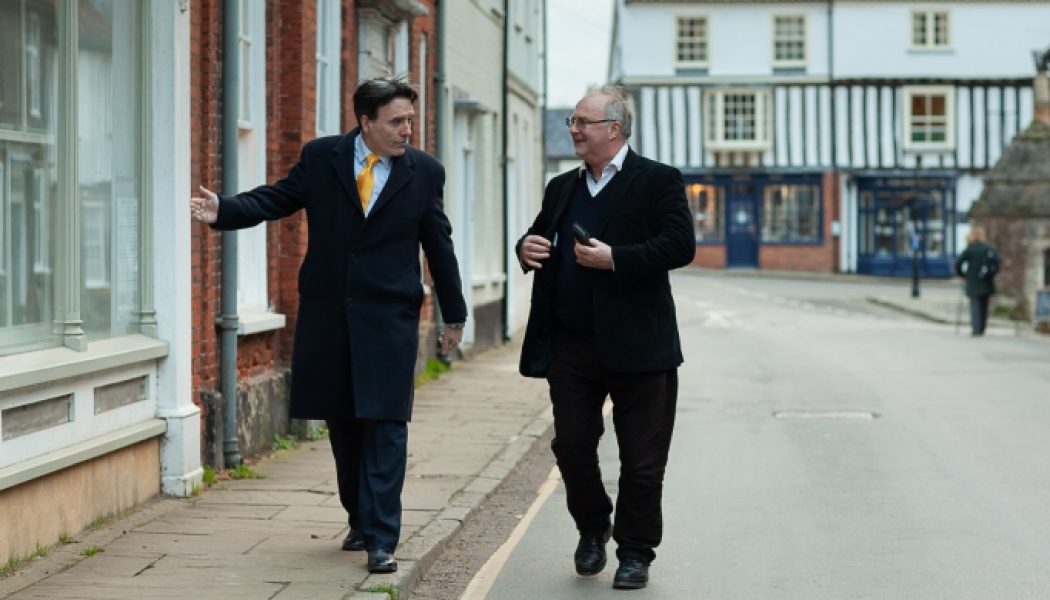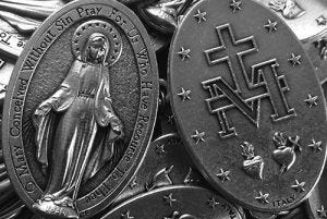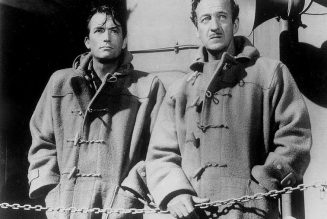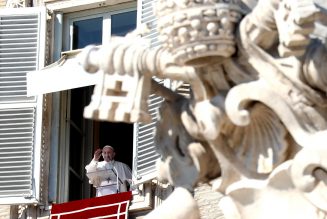Gavin Ashenden chats about his faith journey with U.K. correspondent K.V. Turley in Walsingham, England. (Peter Jones EWTN GB)
Gavin Ashenden explains his decision to enter the Church: ‘It became more and more important to me to belong to the same Church as the saints to whom I had become close in prayer.’
K.V. Turley
WALSINGHAM, England — Just before Christmas 2019, news swept across the internet and the airwaves that Queen Elizabeth’s former Anglican chaplain, Gavin Ashenden, had converted to Catholicism.
For nine years, from 2008 to 2017, Ashenden was one of the Anglican chaplains assigned to the queen. On Dec. 22, 2019, the Fourth Sunday of Advent, at Shrewsbury Cathedral, Bishop Mark Davies received Ashenden into the Catholic Church.
The Register met Ashenden in February 2020 at Walsingham, England’s chief Marian shrine. He had visited Walsingham only once, many decades earlier, when training to become an Anglican clergyman. Now, he came on pilgrimage as a Catholic layman, whose decision to convert had made his immediate future uncertain.
Moment of Grace
As we walk around the ancient streets of Walsingham, the most obvious question is, of course: Why did he decide to become a Catholic? “Slowly, but surely,” Ashenden explained, “over the last 10 years it became clearer, both in my mind and in my prayers, that what the Catholic Church taught, particularly about the Mass, was not only true, but had always been true, from the Apostolic Fathers onwards.” This opening answer did not surprise me. The next part of his reply did: “I began also to explore the role Our Lady has played in the Church, particularly through the rich and diverse history of the apparitions, as the Church discerned them. And along with her, my sense of the importance of the Communion of Saints also grew. It became more and more important to me to belong to the same Church as the saints to whom I had become close in prayer.”
Coming just weeks after the canonization of an earlier Anglican convert to Catholicism, St. John Henry Newman, the news of Ashenden’s conversion made headlines. After so many years as not just part of the Church of England, but as someone at the heart of the Anglican establishment, why did he discern this was the moment to change, to leave Canterbury definitively for Rome? “My own tradition of Anglicanism not only began to develop a more catastrophic heterodoxy,” he explained, “but it became clear to me that, lacking a magisterium, there was no way [for the Anglican Communion] to draw together a coherent theological resistance to the spiritual decadence that this created.”
“So as my own tradition disappeared from under my feet,” he continued, “a number of voices in the Catholic Church, among them my own local Catholic bishop [Bishop Davies], reminded me that a struggle for the purity and faithfulness of the Church would never be wasted if it were brought to the service of Catholicism. Bishop Mark asked me to act on my convictions and be reconciled with the Church, sooner rather than later.”
“I had also begun to realize, with an increasing urgency, that I had a personal responsibility to heal the schism in Christ’s body that my spiritual ancestors had created,” Ashenden added. “And that could only really be done by returning, in all humility, to the Mother Church, in penitence for the schism and by being received penitentially into full Communion.”


Anglican Catholic
Born in 1954, Ashenden grew up in London and Kent. After studying Law at Bristol University, in 1980, he became an Anglican clergyman. Thereafter, for 10 years he worked in various parishes across London. During this time, he was also involved in smuggling Bibles and medicine into the former Soviet Union. In 1982, he was arrested for these activities and interrogated by the KGB, before eventually being released.
By 1989, Ashenden had completed a course of postgraduate study in the psychology of religion at the Jesuit-run Heythrop College, part of the University of London. Doctoral studies followed, in which he studied the life and work of the Oxford Inkling Charles Williams. This led to his doctoral thesis, which was subsequently published in 2006: Alchemy and Integration: A Study of the Life of Writing of Charles Williams (Kent State University Press).
For a total of 23 years, from 1989 to 2012, Ashenden worked as both a senior lecturer and university chaplain at the University of Sussex, teaching the psychology of religion and literature, and convening a master’s program in monotheist mysticism. In addition, from 2008 to 2012, he presented a weekly radio program for the BBC entitled Faith and Ethics.
In more recent years, Ashenden had public disagreements with certain elements within the Anglican Communion whose theological drift was set on a course far from any kind of recognizable Christian orthodoxy. He elaborated: “I found Anglicanism to be more problematically derivative and imitative as the decades went by. Instead of offering a compromise and a breadth of tradition, as I had believed for some time, I began to realize that it had rather dumbed down and produced a distortion of the faith that had been the mark of the Church in all times and all places. So becoming Catholic was rather like climbing up the river, past the crosscurrents of the polluted and confused waters downstream, and returning to the source (ad fontes) where the river was purer and stronger.”
Slow and Sudden
This raised the question: Had Ashenden’s decision come about, then, as the fruit of a gradual process? Or had it occurred as a result of a sudden shift in position? “It is both,” replied Ashenden. “The gradual process is one that has been working quietly under the surface of my mind and soul for decades. But nothing can prepare one for the joy and experience of the moment of being fully reconciled. It has been described so aptly and so often as a ‘coming home.’ It was a deep joy to receive the Holy Eucharist, as one fully integrated into the Church that permeates place and time. It was a great relief being able to talk about devotion to Our Lady and the saints in a way which is now wholly normal, rather than being slightly furtive about this; to be celebratory, instead of trying to avoid causing offense.”
Given the fact that Ashenden did not just leave a religion but also his means of livelihood, what were the reactions of his former Anglican colleagues? “There was a complete range of responses,” he said, “from ‘What took you so long? It was obvious that this was where you belonged and what you believed’ to rather more anxious cries that I had left the tribe, the team and deserted a church in crisis.”
“I tried often to explain,” he added, “that I had done all I could to help and restore the faith we [my old colleagues and I] had shared up to the point, where it became clear that it was impossible and not going to work. But not everyone sees with the same focus or clarity, and I realized, with sadness, that many would not, and could not, perceive my reception into the Catholic Church as the act of faithfulness and obedience that I had been inspired to act on.”
“More interestingly,” however, Ashenden continued, “there have appeared large numbers of people who have written to me saying, ‘We have a deep instinctive sense that you are right, and what you have done is true and real, but we need help working it through ourselves; please help us in our journey, thinking and praying so that we can find the courage and clarity to follow you [into the Church].’”
Public Perspective
Since Ashenden had such a public role in the religious life of the country before his conversion, one wonders what perspectives he has on the future of the state religion, the Church of England, and the current state of the nation for which Anglicanism remains the national church. “Any church that enters into schism with the one, holy, catholic and apostolic Church needs to have a good reason, both for having done so in the first place, and then for continuing the schism,” he explained. “The problem that the Anglican Church faces is that its origins were as much — perhaps even more — political than they were theological. Anglicanism is, as my former Anglican diocesan [bishop] explained in sadness more than a decade ago, ‘a 500-year-old ecumenical experiment that has just failed.’”
Ashenden explained further: “While it had a platform to Christianize the nation within the context of European Protestantism, it could claim a Gospel rationale. But now that it has surrendered its theological thinking to the fashions and currents of secularism and, in particular, feminism, and made itself acceptable to progressive culture as a price for trying to insulate itself from popular criticism, it has lost its credentials as a church. And it will soon find that it has not managed to buy favor from an increasingly secular popular culture, and so has fallen between two stools.”
Ashenden is in no doubt about the challenges ahead for Christianity within England: “Facing as we do a more determined and aggressively progressive culture on one side, and a demographic future that will see over half the population following Islam by 2050, I want to strongly suggest to my former community that only the Catholic Church has the clarity of self-understanding, and the spiritual history and resources, to face both these enormous challenges to our neighbors’ souls and well-being now, and, more importantly, after death.”
Standing in the once ruined and now restored shrine of Walsingham, Ashenden is clear that “these islands and Europe urgently need re-converting, and only the Catholic Church can do it and bring people into the fullness of Christian faith and the depths of holiness it has the potential to offer.”
To Be Continued
Given all that has occurred in Gavin Ashenden’s life in these past months, what does the future hold?

“Only God knows,” he responded. “But I am very grateful that the Church has agreed to look at my journey this far and discern whether or not I have a vocation as a Catholic priest, to allow me to support as fully as I can my bishop and his diocese in the mission to build the Church here; and in so doing reclaim England for the Church that brought the Gospel to this island in the first place.”
K.V. Turley is the Register’s U.K. correspondent.







